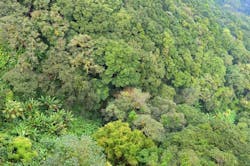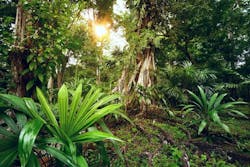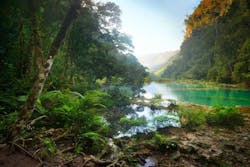U.K. and U.S. agencies use Astrosat space-based technology to combat illegal rainforest devastation
EDINBURGH, Scotland, 9 March 2016. Timber is being removed from fragile rainforests illegally to the detriment of the farming community and environment, including water, wildlife, and rare species of plants, insects, and animals. Guatemalan famers are fighting back with the help of "CCTV in the sky" space-based technology from Astrosat, a global space services and management company in Edinburgh, Scotland.
Space technology experts at Edinburgh-based Astrosat are working on a U.K. Space Agency project to stop deforestation of vast tracts of land in Central America, particularly where Guatemala borders Mexico.
Forests cover one third of Guatemala’s land area, with nearly 40 percent primary forests. Primary forests are forests of native tree species, where no clearly visible indications of human activities exist and the ecological processes are not significantly disturbed. The annual rate of deforestation was 1 percent for the period 2010 through 2015 and illegal logging is a widespread problem in the country.
Astrosat, which specializes in earth observation using earth-viewing instruments, has teamed up with U.K.- and U.S.-based company Earth Observation Ltd to monitor forests and detect illegal activity, enabling law enforcement agencies to take action against offenders.
"What we are working on here is could be described as a CCTV system which operates from space,” Astrosat CEO and Founder Steve Lee says. “With the data and information we can garner, we can help countries and communities which are at the mercy of unscrupulous operators. This, in effect, brings space -- and space companies and organizations -- into the Fair Trade arena, by helping local farmers and villagers to manage sustainable timber reserves. Illegal logging not only undercuts markets, but has a devastating effect on vital ecosystems."
Astrosat's technology will help the Guatemalan government agencies to monitor large forested areas, such as the rich and diverse Reserva de Biosfera Maya and a series of important national parks along the border.
"Data and information from space sources is increasingly important in allowing countries which do not have significant satellite resources to implement action programs on issues such as this which directly affect the lives of their citizens," Lee explains.
Astrosat CEO and Founder Steve Lee -->
Guatemalan rainforest images courtesy Shutterstock.
You might also like:
Subscribe today to receive all the latest aerospace technology and engineering news, delivered directly to your e-mail inbox twice a week (Tuesdays and Thursdays). Sign upfor your free subscription to the Intelligent Inbox e-newsletter at http://www.intelligent-aerospace.com/subscribe.html.
Connect with Intelligent Aerospace on social media: Twitter (@IntelligentAero), LinkedIn,Google+, and Instagram.
Intelligent Aerospace
Global Aerospace Technology NetworkIntelligent Aerospace, the global aerospace technology network, reports on the latest tools, technologies, and trends of vital importance to aerospace professionals involved in air traffic control, airport operations, satellites and space, and commercial and military avionics on fixed-wing, rotor-wing, and unmanned aircraft throughout the world.

Courtney E. Howard | Chief Editor, Intelligent Aerospace
Courtney enjoys writing about all things high-tech in PennWell’s burgeoning Aerospace and Defense Group, which encompasses Intelligent Aerospace and Military & Aerospace Electronics. She’s also a self-proclaimed social-media maven, mil-aero nerd, and avid avionics and space geek. Connect with Courtney at [email protected], @coho on Twitter, on LinkedIn, and on Google+.





